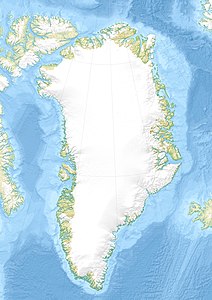Humboldt Glacier
| Humboldt Glacier Glacier | ||
|---|---|---|
|
Satellite photo |
||
| location | Greenland | |
| Type | Outlet glacier | |
| width | Max. 110 km | |
| Coordinates | 79 ° 30 ′ N , 63 ° 0 ′ W | |
|
|
||
|
map |
||
The Humboldt Glacier (on Greenlandic also Sermersuaq ( ice cap called)) located in the northwest of Greenland and the north by the Washington-country and in the south and west of Inglefield Land limited. It flows into the Peabody Bugt and the Kane Basin , which is part of the arctic Nares Strait between Greenland and Canada's Ellesmere Island . It was discovered in 1853 by the American polar explorer Elisha Kent Kane and named after Alexander von Humboldt .
With an mouth width of over 100 kilometers, it is the widest glacier in the northern hemisphere. The Humboldt Glacier is fed by the Greenland Ice Sheet . Together with the Petermann glacier further north, this results in a catchment area of 121,000 km², which corresponds to 10% of the total area of the catchment areas of all Greenland glaciers.
Like many other Greenland glaciers, the Humboldt Glacier is retreating. At the end of summer 2009 - compared to 2008 - the ice area in the estuary had decreased by 37 km².
Web links
- NASA Earth Observatory , Sermersuaq (Humboldt) Glacier, Greenland, picture of the day, December 16, 2008
Individual evidence
- ↑ Wolfgang-Hagen Hein (Ed.): Alexander von Humboldt. Life and work . Boehringer, Ingelheim 1985, ISBN 3-921037-55-7 , pp. 273 .
- ^ Greenpeace in Greenland: The Arctic Sunrise surveys the Petermann glacier (Telegraph, UK)
- ↑ Changes in the Velocity Structure of the Greenland Ice Sheet ( Memento of February 22, 2014 in the Internet Archive ), Eric Rignot & Pannir Kanagaratnam , 2006, Science 311, pages 986–990, Table 1 (PDF article; 404 kB)
- ↑ Humboldt Glacier retreats ( Memento from January 7, 2015 in the Internet Archive ) Comparative study by the Byrd Polar Research Center for the years 2000 and 2008 (in English)
- ^ Arctic Report Card Greenland ( Memento of October 15, 2011 in the Internet Archive ), Box et al. 2009, NOAA (in English)


